Search Results for 'friend'
-
AuthorSearch Results
-
January 18, 2026 at 8:18 am #8049
In reply to: The Hoards of Sanctorum AD26
Phurt was starting to think something fishy was a play, each time he thought his short spider life had ended he was pulled back from Spiderheaven by some unknown force. Not that he minded this time, there were plenty of places to hide and cast his strong silk cables. He had developed a sense of adventure and the sheer height of some of the mounds made him dizzy. It also made him want to be the first spider in the history of this thread to climb on top of that Mount Wobbly of the Topperware Chain.
Phurt had also noticed a strange and strong smell that seemed to come from the top of Mount Wobbly. Not that he minded the hygiene of the place; it was, to the contrary, a rather promising smell. It was the smell that said swarms of flies would gather there like an endless supply of blessed food.
Seeing that other spiders were gathering at the bottom of Mount Wobbly, he contorted his butt and secured his first cable.

Spirius had been investigating the origin of a strong smell that had started not long after Austreberthe puffed out of existence and became part of the dust she had spent her life chasing away. Which gave him one more proof that his theory of the holy body influence upon the physical world was true. He looked for a pen but they were behind two piles of unopened parcels he had started collecting when he had noticed that the postmen were leaving the boxes unattended and unprotected from the elements on the front porch of houses. His intentions were pure, as any saintly intentions are, but when he saw what good addition to the other boxes they made, he felt a pang of regret each time he thought of giving back those boxes to their rightful recipients.
Alas, most of them were dead by now, so he felt his duty was to keep those boxes intact to honour the memory of the dead.
Yvoise came in just as Spirius saw an odd and colourful australian jumping spider cast a delicate silk thread to one of the bottom row of his Tupperware collection.
“You should really do something about that smell,” she said. “I remember a time when decorum required holy people to exude only fragrance and essential oils.”
“Well, you know, it’s Austreberthe,” he said as wobbly as his heaps of plastic boxes. He had them all. You could even say he started the whole trend of pyramid schemes when his friend Pearl Topper saw him buy boxes from antiques shops. She invented the first plastic box as…
“Well, I asked you a question,” said Yvoise, interrupting his wandering thoughts.
“Have you noticed the spiders,” said Spirius.
“What spiders?”
“I think they’re trying to go up there,” Spirius said. “Look!”
He pointed a proud finger at the top of the highest Topperware tower in the Guyness book of records. A swarm of flies was circling around one of the boxes.
“And that means the smell comes from there.”
January 6, 2026 at 6:20 pm #8044In reply to: The Hoards of Sanctorum AD26
With a warm smile of approval, Cerenise tapped out the names and dates on her keyboard. So refreshing when people were original when naming the fruit of their loins, she thought. Some of the family trees she’d done for friends and clients had been a veritable cesspit of endlessly repeated Johns and Marys, Williams and Elizabeths. Despite suppressing a shudder when introduced to a modern human named River or Sky, or worse, the ridiculously creative spelling of a common name, some of the older examples of unusual names she found quite delightful. Especially, it had to be said, French ones.
Pierre Wenceslas Varlet born on the 28th of September, 1824 in Clenleu, Pas-de-Calais, brother of Austreberthe Varlet, born two years previously on the 8th of June. Wenceslas! What would you call Wenceslas for short? she mused. Wence?
“An ’twere not as good a deed as drink to turn true man and to leave these rogues, I am the veriest varlet that ever chewed with a tooth”.
A cautious knock at the door interrupted Cerenise’s mental meanderings.
“Enter,” she called, and Laddie Bentry sidled in looking sheepish.
“Ah, it’s you, the veriest varlet of number 26. Well, what is it? You look as though you accidentally dropped Helier’s trashy novel in the water butt.”
Taken aback by Cernice’s perspicacity, Laddie recoiled slightly and then squared his shoulders. “How did you know?” he asked.
“Oh just a lucky guess,” Cerenise replied breezily, tapping the side of her nose. “I suppose you want me to order you another copy from Amaflob before he notices? I’ll arrange for an express delivery. Keep an eye out for the delivery man”
Waving away his thanks, she picked up the old document on her desk that Yvoise had kindly provided, albeit reluctantly, and squinted at it. She could make out the name Austreberthe, but what did the rest say?
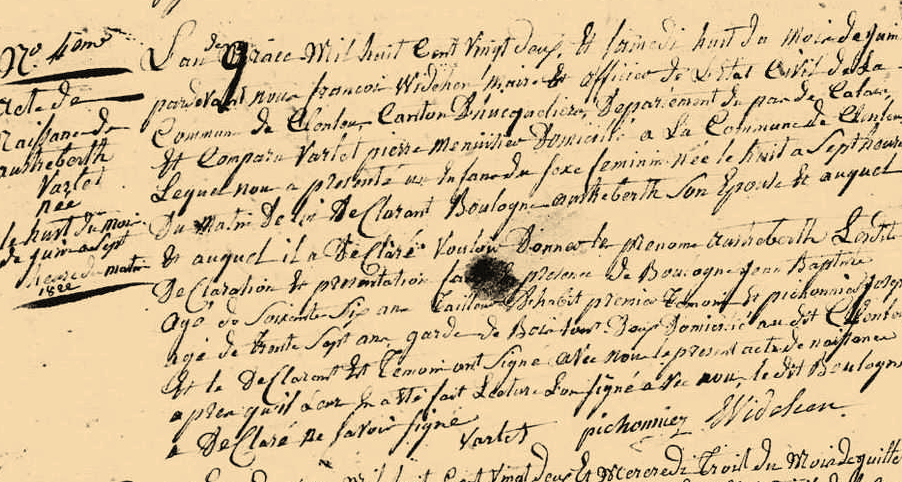
Cerenise dozed off, dreaming of the Folies Bergere. The atmosphere was exciting and convivial at first, escalating into an eruption of approval when the new act came on the stage. Cerenise felt the energy of the crowd but her attention was drawn to the flamboyant figure of a man dressed as one of the three kings of the Magi, and he was making his way over to her. Why, it was Lazuli Galore! What on earth was he doing here? And who was that dumpy overly made up woman in the blue dress, Godfreda, who had tagged along with them?
Another knock on the door wakened her and she called out “Come in!” in an irritable tone. She’d been having such fun in the dream. “Oh it’s you, oh good, the book has arrived.”
Laddie shifted his feet and replied, “Well yes, a Liz Tattler novel has arrived.”
“Oh, good, well be off with you then so I can get on with my work.”
“But it’s not The Vampires of Varna. It’s The Valedictorian Vampires of Valley View High.”
“Jolly good, I expect you’ll enjoy it,” Cerenise said, picking up the old document again and peering at it. Perceiving that Laddie had not yet exited the room, she looked up. “Helier won’t notice, those books are all the same. Now get off with you.”
December 31, 2025 at 11:11 am #8009In reply to: Finder’s Keepers of the Hoard
Some ideas for the background thread and character profiles for “The Hoards of Emporium 26.”
The Setting: Emporium 26
They live in Gloucester (ancient Glevum), a city built on Roman bones where the layout of the streets still follows the legions’ sandals. They inhabit a sprawling, shared Georgian townhouse complex that has been knocked through into one labyrinthine dwelling—Number 26.
To the outside world, it looks like a dilapidated heritage site. Inside, it is The Emporium: a geological stratification of history, where layers of Roman pottery are mixed with 1990s Beanie Babies and medieval reliquaries.
The Background Thread: “The Weight of Eternity”
Why do they hoard? Because when you live forever, “letting go” feels like losing a piece of the timeline. Hoarding objects is for them an accumulation of evidence of existence.
- The Curse: They cannot die naturally, but they can fade if they are forgotten. The “stuff” anchors them to the physical plane.
- The “Halo” Effect: Occasionally, when they are arguing over whose turn it is to do the dishes, or when they find a lost treasure, the stained-glass light of their old divinity flickers behind their heads—a neon halo of forgotten holiness.
The Hoarders & Their Stashes
1. Helier ( The Hermit / The Dreamer)
- Saintly Origin: Based on St. Helier (Jersey/Normandy). He was an ascetic hermit who lived in a cave and was eventually beheaded.
- Modern Persona: A soft-spoken agoraphobe who hasn’t left the house since the invention of the internet. He wears oversized cardigans that smell like old library books.
- The Mania: Escapism & Communication.
- Because he spent centuries in silence on a rock, he is now obsessed with human stories and noise.
- The Hoard: ” The Media Mountain.”
- His wing of the house is a fire hazard of pulp fiction, towering stacks of National Geographic (dating back to the first issue), thousands of VHS tapes (he has no VCR), and tangled knots of ethernet cables that he refuses to throw away “in case they fit a port from 1998.”
- The Secret Stash: Beneath a pile of “The Hoarder Vampires” novels lies his true relic: The Stone Pillow. The actual rock he slept on in the 6th century. He still naps on it when his back hurts.
2. Spirius (The Bishop / The Container)
- Saintly Origin: Evocative of St. Exuperius (Bayeux). A driver-out of demons and a man of grand gestures.
- Modern Persona: A nervous, fidgety man who is convinced the world is leaking. He is the “fixer” of the group but usually makes things worse with duct tape.
- The Mania: Containment & Preservation.
- In the old days, he bottled demons. Now, he’s terrified of running out of space to put things.
- The Hoard: “The Vessel Void.”
- Spirius hoards anything that can hold something else. Empty jam jars (washed, mostly), Tupperware with no matching lids, biscuit tins, and thousands of plastic carrier bags stuffed inside other carrier bags (the “Bag of Bags”).
- The Secret Stash: In a locked pantry, he keeps a shelf of sealed mason jars labeled with dates like “1431” or “1789.” He claims they contain the “Sigh of a King” or “The smell of rain before the Plague.” It’s actually just dust, but the jars vibrate slightly.
3. Cerenise (The Weaver / The Mender)
- Saintly Origin: Evocative of St. Ceneri or St. Cerneuf. A saint of travelers, or perhaps needlework.
- Modern Persona: She is the “Wheelchair Girl’s” friend mentioned in the intro? Or perhaps she is in a wheelchair now—not because she can’t walk, but because she’s too tired from walking for 1,500 years. She is sharp-tongued and fashionable in a “crazy bag lady” sort of way.
- The Mania: Potential & Texture.
- She sees the soul in broken things. She cannot throw away anything that “could be fixed.”
- The Hoard: “The Fabric of Time.”
- Her rooms are draped in layers of textiles: velvet curtains from a 1920s cinema, moth-eaten tapestries depicting her own miracles (she thinks the nose is wrong), and buttons. Millions of buttons. She also hoards broken appliances—toasters, lamps, clocks—insisting she will repair them “next Tuesday.”
- The Secret Stash: A mannequin dressed in a perfectly preserved Roman stola, hidden under forty layers of polyester coats. It’s the outfit she wore when she performed her first miracle. She tries it on every New Year’s Eve.
4. Yvoise (The Advocate / The Bureaucrat)
- Saintly Origin: Evocative of St. Yves (Patron of Lawyers/Brittany/Normandy). The arbiter of justice.
- Modern Persona: The “Manager” of Emporium 26. She wears power suits from the 80s and is always carrying a clipboard. She loves rules, even if she invents them.
- The Mania: Proof of Truth.
- She is terrified of being forgotten or cheated. She needs a receipt for everything.
- The Hoard: “The Archive of Nothing.”
- Yvoise hoards paper. Receipts from a coffee bought in 1952, bus tickets, expired warranties, junk mail, and legal disclaimers torn off mattresses. Her room looks like the inside of a shredder that exploded. She claims she is building “The Case for Humanity.”
- The Secret Stash: A filing cabinet labeled “Do Not Open.” Inside is not paper, but Seeds. Seeds from the trees of ancient Gaul. She is saving them for when the paper finally takes over the world and she needs to replant the forest she misses.
Starter: The Reading of Austreberthe’s Will
The story kicks off because Austreberthe (The Saint of Washing/Water) has died. Her hoard was Soap and Water.
- The house is now flooding because her magical containment on the plumbing has broken.
- The remaining four must navigate her “Tsunami Wing”—a treacherous dungeon of accumulated bath bombs, stolen hotel towels, and aggressive washing machines—to find her Will.
- The Will is rumored to reveal the location of the “Golden Key,” an object that can legally terminate their lease on Emporium 26, which none of them want, but all of them crave.
December 31, 2025 at 9:52 am #8004Topic: The Hoards of Sanctorum AD26
in forum Yurara Fameliki’s Stories“The girl in the wheelchair that visited sent me pics of her friend’s house… she is a hoarder…”
Helier put down the enthralling new Liz Tattler’s novel “The Vampire Hoarders of Varna”. He wondered if she’d done the topic any justice. But as with any good Liz Tattler novel, you were sure to be in for a ride.
Helier tended to lose track of time; it wasn’t as if anything was urgent, what was a few years of waiting for him.
But it wasn’t often one of them died —almost two hundred years that Audomar had left. Now Austreberthe had left her mortal coils too, just at the eve of the New Year. She must have grown sick of counting them.It was a mixture of pain and joy. Not as you’d think — Austreberthe had accumulated centuries of treasures, and after the ceremony, there would be the reading of the will, and they would know, the surviving ones, who would get the access to her trove.
Spirius, Cerenise and Yvoise would surely be there too.
July 16, 2025 at 6:06 am #7969In reply to: The Elusive Samuel Housley and Other Family Stories
Gatacre Hall and The Old Book
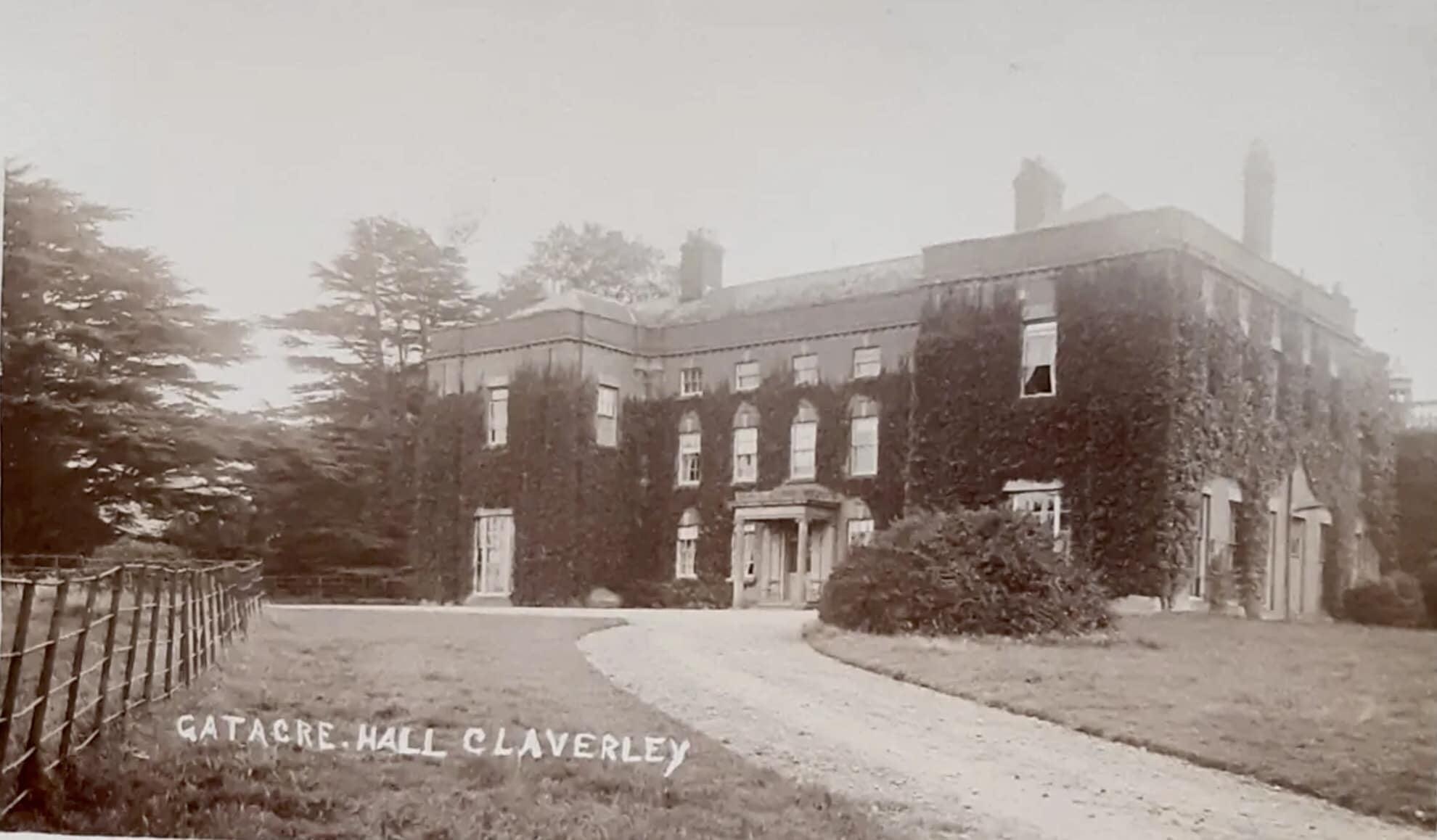
In the early 1950s my uncle John and his friend, possibly John Clare, ventured into an abandoned old house while out walking in Shropshire. He (or his friend) saved an old book from the vandalised dereliction and took it home. Somehow my mother ended up with the book.
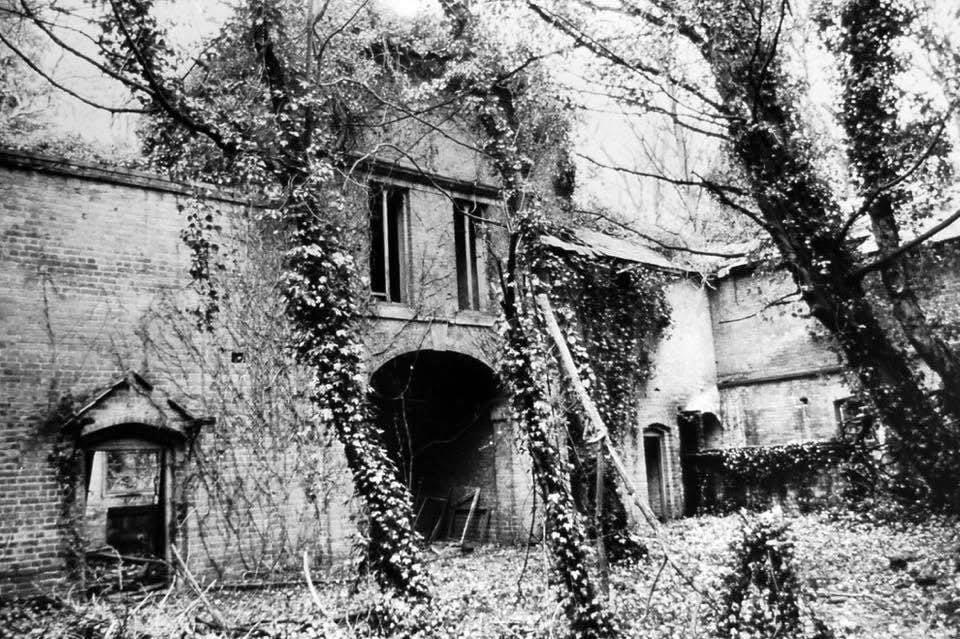
I remember that we had the book when we were living in USA, and that my mother said that John didn’t want the book in his house. He had said the abandoned hall had been spooky. The book was heavy and thick with a hard cover. I recall it was a “magazine” which seemed odd to me at the time; a compendium of information. I seem to recall the date 1553, but also recall that it was during the reign of Henry VIII. No doubt one of those recollections is wrong, probably the date. It was written in English, and had illustrations, presumably woodcuts.
I found out a few years ago that my mother had sold the book some years before. Had I known she was going to sell it, I’d have first asked her not to, and then at least made a note of the name of it, and taken photographs of it. It seems that she sold the book in Connecticut, USA, probably in the 1980’s.
My cousin and I were talking about the book and the story. We decided to try and find out which abandoned house it was although we didn’t have much to go on: it was in Shropshire, it was in a state of abandoned dereliction in the early 50s, and it contained antiquarian books.
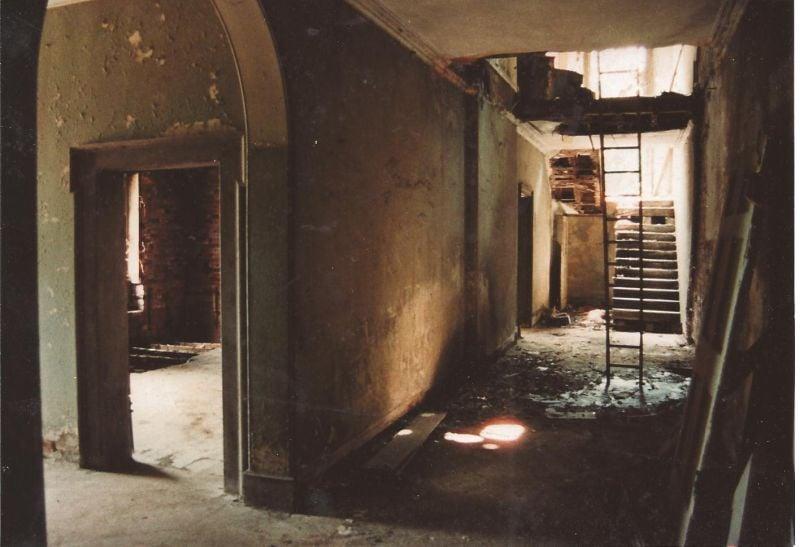
I posted the story on a Shropshire History and Nostalgia facebook group, and almost immediately had a reply from someone whose husband remembered such a place with ancient books and manuscripts all over the floor, and the place was called Gatacre Hall in Claverley, near Bridgnorth. She also said that there was a story that the family had fled to Canada just after WWII, even leaving the dishes on the table.
The Gatacre family sailing to Canada in 1947:
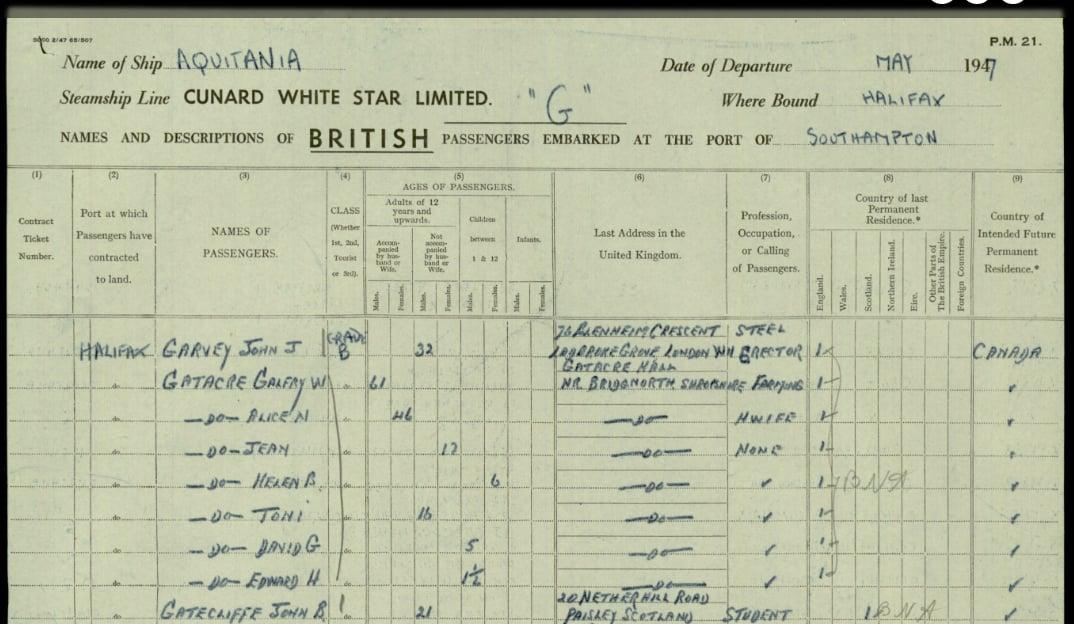
When my cousin heard the name Gatacre Hall she remembered that was the name of the place where her father had found the book.
I looked into Gatacre Hall online, in the newspaper archives, the usual genealogy sites and google books searches and so on. The estate had been going downhill with debts for some years. The old squire died in 1911, and his eldest son died in 1916 at the Somme. Another son, Galfrey Gatacre, was already farming in BC, Canada. He was unable to sell Gatacre Hall because of an entail, so he closed the house up. Between 1945-1947 some important pieces of furniture were auctioned, and the rest appears to have been left in the empty house.
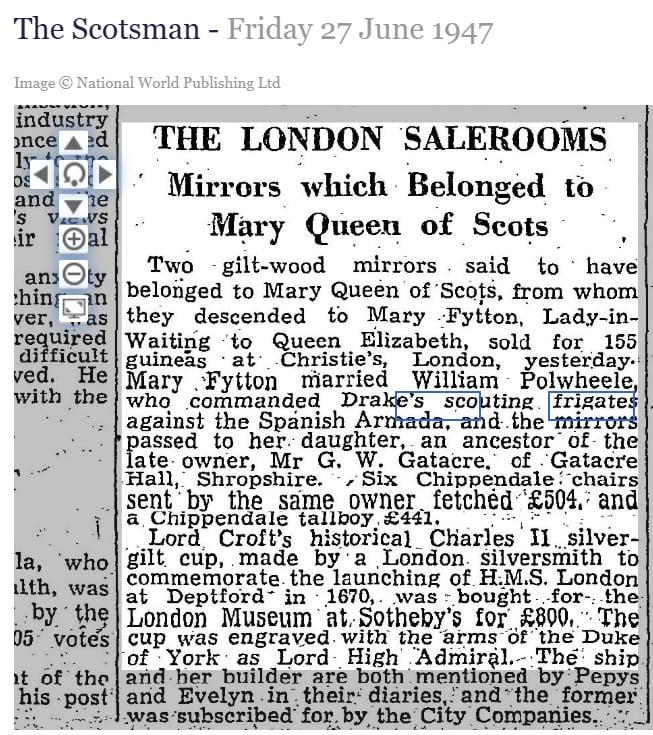
The family didn’t suddenly flee to Canada leaving the dishes on the table, although it was true that the family were living in Canada.
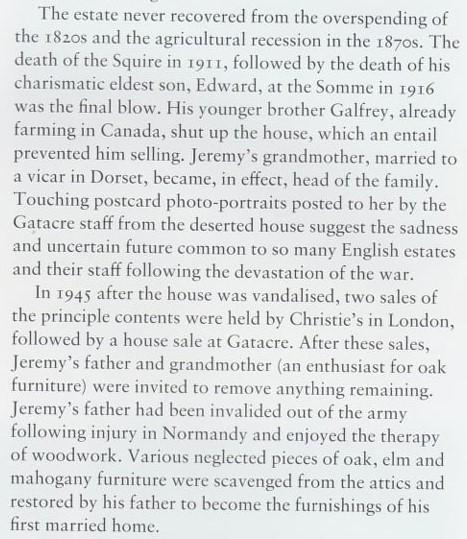
An interesting thing to note here is that not long after this book was found, my parents moved to BC Canada (where I was born), and a year later my uncle moved to Toronto (where he met his wife).
Captain Gatacre in 1918:
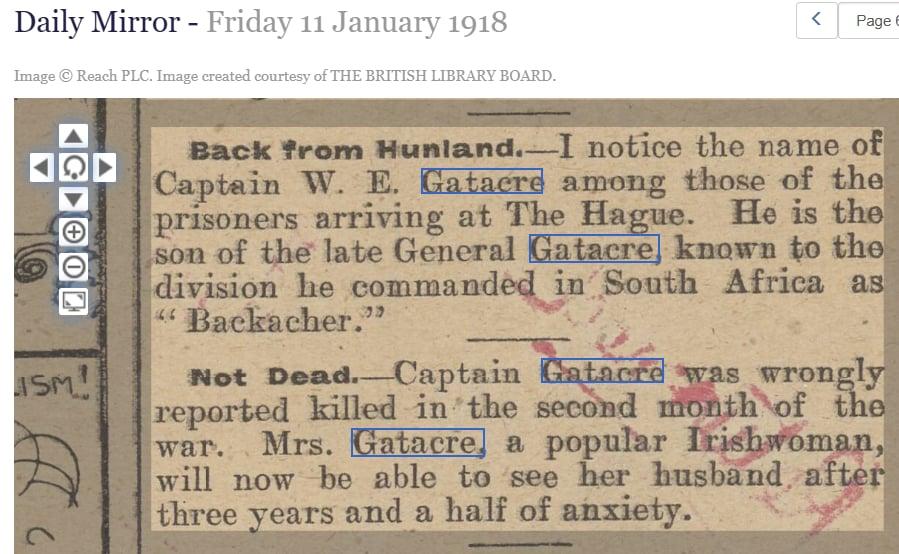
The Gatacre library was mentioned in the auction notes of a particular antiquarian book:
“Provenance: Contemporary ownership inscription and textual annotations of Thomas Gatacre (1533-1593). A younger son of William Gatacre of Gatacre Hall in Shropshire, he studied at the English college at the University of Leuven, where he rejected his Catholic roots and embraced evangelical Protestantism. He studied for eleven years at Oxford, and four years at Magdalene, Cambridge. In 1568 he was ordained deacon and priest by Bishop of London Edmund Grindal, and became domestic chaplain to Robert Dudley, 1st Earl of Leicester and was later collated to the rectory of St Edmund’s, Lombard Street. His scholarly annotations here reference other classical authors including Plato and Plutarch. His extensive library was mentioned in his will.”
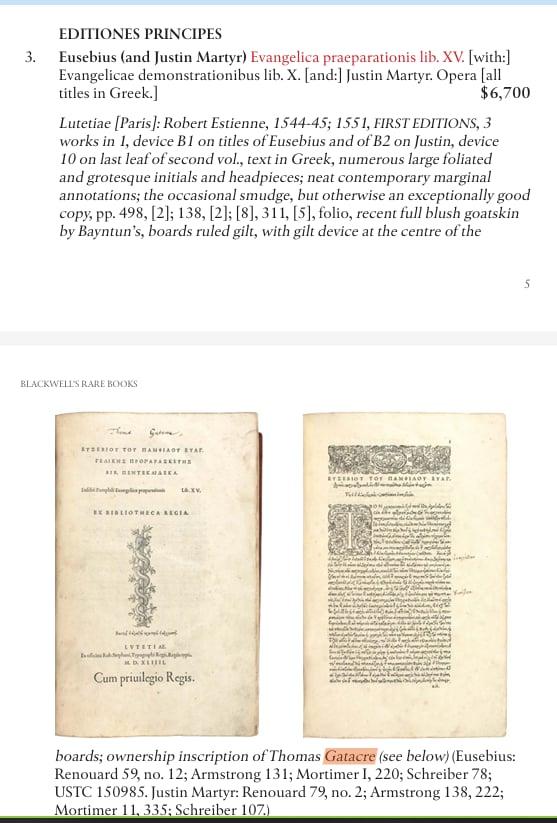
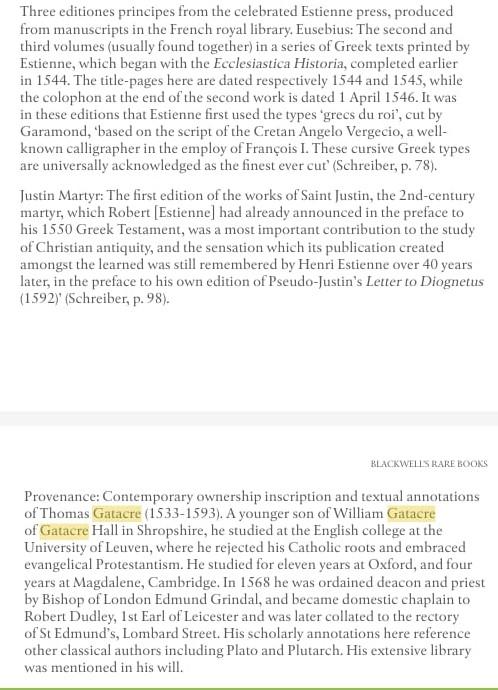
There are thirty four pages in this 1662 book about Thomas Gatacre d 1654:
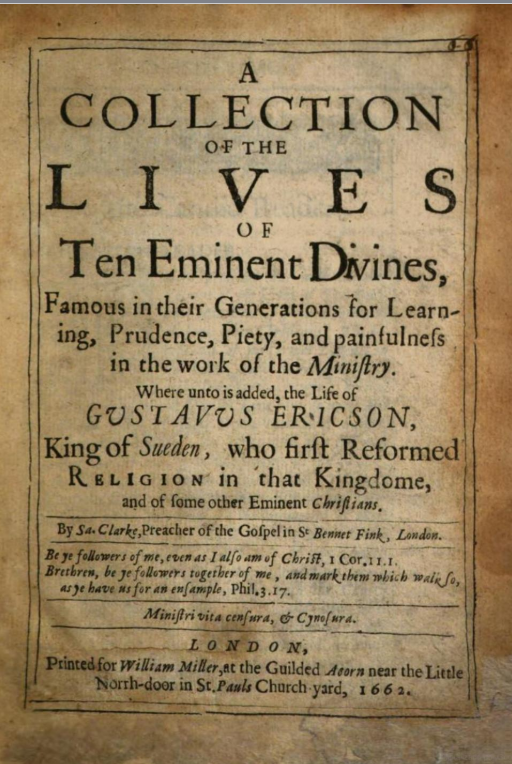
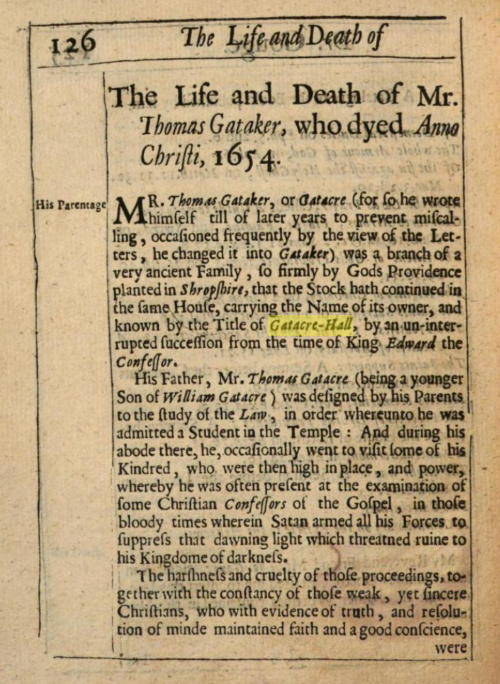 June 11, 2025 at 10:13 am #7959
June 11, 2025 at 10:13 am #7959In reply to: Cofficionados Bandits (vs Lucid Dreamers)
“Buns and tarts!” called a street vendor from the street outside the Gazebar. “Freshly baked Memory Pies! Nostalgia Rolls! Selling like Hot Cakes! Come and get ’em before they run out!”
Chico realised he’d hardly eaten a thing since becoming a new character. Maybe this is how character building works.
“I’ll take one of each,” Chico said to the smiling round faced vendor. I need to stock up on memories.
“Are they all for you, sir?” the vendor asked. Chico couldn’t help thinking he looked like a frog. Nodding, Chico said, “Yeah, I’m hungry for a past.”
“We normally suggest just one at a time,” the frog said (for he had indeed turned into a frog), “But you look like a man with a capacity for multiple memories. Are you with friends?”
“Er, yeah, yes I’m with friends,” Chico replied. Are the other new characters my friends? “Yes, of course, I have lots of friends.” He didn’t want the frog vendor to think he was friendless.
“Then we suggest you share each cake with the friends you want to share the memory with.”
“Oh right. But how do I know what the memory is before I eat the cake?”
“Let me ask you this,” said the frog with a big smile, “Do real people choose who to share their memories with? Or know in advance what the memories will be?”
“How the hell would I know!” Chico said, roughly grabbing the paper bag of buns. “I’m new here!”
May 17, 2025 at 10:58 pm #7940In reply to: Cofficionados – What’s Brewing
 The Cofficionados Theme Song “Dont Trust a Goat with a Plan”
The Cofficionados Theme Song “Dont Trust a Goat with a Plan”[Verse]
Goat in a bow tie whispers
“Trust me
My dear”
A plan in its hooves but intentions unclear
Guard the coffee belt like a treasure map’s end
Four bandits are plotting to twist and upend[Chorus]
Don’t trust a goat with a plan
My friend
They’ll sip your dreams while you defend
Lucid nights sabotaged mid-spin
By cofficionados sneaking in[Verse 2]
Carob in shadows
No cocoa in sight
Thiram with whispers that steal your midnight
Amy’s sweet smile hides beans of deceit
Chico grinds chaos
The bitter elite[Bridge]
Sleep-parachute breaches
Reverse dreams collide
They’ve hijacked your pillow for the wildest ride
Beware the saboteurs that seep in deep
Between dripping espresso and REM sleep[Chorus]
Don’t trust a goat with a plan
My friend
They’ll sip your dreams while you defend
Lucid nights sabotaged mid-spin
By cofficionados sneaking in[Verse 3]
Pour your resistance in a steaming haze
Shield the roast aroma from their forking ways
The bandits want dominion over your grind
But you’ll wake alert with their schemes left behindMay 10, 2025 at 7:51 am #7920In reply to: Cofficionados – What’s Brewing
Key Characters (with brief descriptions)
Amy Kawanhouse – Self-aware new character with metatextual commentary. Witty, possibly insecure, reflective; has a goat named Fanella and possibly another, Finnley, for emergencies. Often the first to point out logical inconsistencies or existential quirks.
Carob Latte – Tall, dry-humored, and slightly chaotic. Fond of coffee-related wordplay and appears to enjoy needling Amy. Described as having “frizzled” hair and reverse-lucid dreams.
Thiram Izu – The practical one, technologically inclined but confused by dreams. Tends to get frustrated with the group’s lack of coordination. Has a history of tension with Amy, and a tendency to “zone out.”
Chico Ray – Mysterious newcomer. May have appeared out of nowhere. Unclear loyalties. Possibly former friend or frenemy of the group, annoyed by past incidents.
Juan & Dolores Valdez – Fictional coffee icons reluctantly acknowledging their existence within a meta-reality. Dolores isn’t ready to be real, and Juan’s fine with playing the part when needed.
Godric – Swedish barista-channeler. Hints at deeper magical realism; references Draugaskalds (ghost-singers) and senses strange presences.
Ricardo – Appears later. Described in detail by Amy (linen suit, Panama hat), acts as a foil in a discussion about maps and coffee geography. Undercover for a mission with Miss Bossy.
The Padre – Could be a father or a Father. Offstage, but influential. Concerned about rain ruining crops. A source of exposition and concern.
Fanella – Amy’s cream goat, serves as comic relief and visual anchor.
Finnley, the unpredictable goat, is reserved for “life or death situations.”April 20, 2025 at 11:24 am #7896In reply to: Cofficionados Bandits (vs Lucid Dreamers)
“Juan, was it wise to speak to that man?” Dolores asked her husband. “The cat’s out of the bag now, when Chico tells his friends…”
“Trust me, Dolores,” Juan Valdez implored, “What else can we do? We need their help.”
“But you’ve been fictional for so long, Juan. Nobody knew you were real. Until now.”
“You worry too much! It’s hardly going to make headlines on Focks News, is it, and even if it did, nobody believes anything anymore. We can just spread a rumour that it was made up by one of those artifical story things.”
“But he took a photo of you!”
“Dolores,” Juan said with exaggerated patience, “Nobody believes photos any more either. I’m telling you, they make fakes these days and nobody can tell. Trust me,” he repeated, giving her shoulder a reassuring squeeze.
“So we’ll still be fictional, Juan?” Dolores asked in an uncertain tone. “Because I’m not ready to be a real character yet, it seems so….so time consuming, to be real every day, all day… doing all those things every day that real people do…”
“No, no, not at all! You only have to play the part when someone’s looking!”
“I hope you’re right. Too many things changing all at once, if you ask me.” And with that Dolores vanished, as nobody was looking at her.
April 20, 2025 at 8:00 am #7893In reply to: Cofficionados Bandits (vs Lucid Dreamers)
“Where are they again?” Thiram was straining as he waited for his friends, or rather colleagues.
“Typical of them to get us all excited, and then bailing out to some mundane excuses.”
He started to pace around the shed where they were supposed to meet. He wasn’t clear about all the details, Amy, or Carob would have them. Chico would be here for the ride, but the master plan this time was for the girls to come up with.
What was happening at the plantation? Something unusual for sure; the Lucid Luddite Dreamers and their Silly Intelligence devices were always looking to disrupt the flows of coffee of the remaining parts where they still grew. That was why their mission was so important. Or so he was told.
“Bugger… they could at least answer their damn phones… AI might well be everywhere, but you can’t just be all cavemen about it.”
A rush of ruffled dried leaves and a happy bleating caught his attention at the moment he was about to leave. A panting Amy arrived, with her cream goat “Fanella” in tow —the bleating was from her, obviously. She didn’t take “Finnley”, the black one, she was too unpredictable; Amy would only keep her around for life or death situations that required a fair deal of rude practicality, and a good horn’s ramming.
“Sorry, sorry!” Amy blurted out in hushed tones. “I couldn’t get away from the Padre. He’s too worried about stuff…”
Thiram shrugged “at least there’s one. And what about the others?”
“Oh, what? I’m not the last to arrive? That’s new.”
Thiram rolled his eyes and gave a twig with fresh leaves to Fanella to eat.
March 22, 2025 at 10:00 am #7874In reply to: The Last Cruise of Helix 25
A Quick Vacay on Mars
“The Helix is coming in for descent,” announced Luca Stroud, a bit too solemnly. “And by descent, I mean we’re parking in orbit and letting the cargo shuttles do the sweaty work.”
From the main viewport, Mars sprawled below in all its dusty, rust-red glory. Gone was the Jupiter’s orbit pulls of lunacy, after a 6 month long voyage, they were down to the Martian pools of red dust.
Even from space, you could see the abandoned domes of the first human colonies, with the unmistakable Muck conglomerate’s branding: half-buried in dunes, battered by storms, and rumored to be haunted (well, if you believed the rumors from the bored Helix 25 children).
Veranassessee—Captain Veranassessee, thank you very much— stood at the helm with the unruffled poise of someone who’d wrested control of the ship (and AI) with consummate style and in record time. With a little help of course from X-caliber, the genetic market of the Marlowe’s family that she’d recovered from Marlowe Sr. before Synthia had had a chance of scrubbing all traces of his DNA. Now, with her control back, most of her work had been to steer the ship back to sanity, and rebuild alliances.
“That’s the plan. Crew rotation, cargo drop, and a quick vacay if we can manage not to break a leg.”
Sue Forgelot, newly minted second in command, rolled her eyes affectionately. “Says the one who insisted we detour for a peek at the old Mars amusements. If you want to roast marshmallows on volcanic vents, just say it.”
Their footsteps reverberated softly on the deck. Synthia’s overhead panels glowed calm, reined in by the AI’s newly adjusted parameters. Luca tapped the console. “All going smoothly, Cap’n. Next phase of ‘waking the sleepers’ will happen in small batches—like you asked.”
Veranassessee nodded silently. The return to reality would prove surely harsh to most of them, turned soft with low gravity. She would have to administrate a good dose of tough love.
Sue nodded. “We’ll need a slow approach. Earth’s… not the paradise it once was.”
Veranassessee exhaled, eyes lingering on the red planet turning slowly below. “One challenge at a time. Everyone’s earned a bit of shore leave. If you can call an arid dustball ‘shore.’”
The Truce on Earth
Tundra brushed red dust off her makeshift jacket, then gave her new friend a loving pat on the flank. The baby sanglion—already the size of a small donkey—sniffed the air, then leaned its maned, boar-like head into Tundra’s shoulder. “Easy there, buddy,” she murmured. “We’ll find more scraps soon.”
They were in the ravaged outskirts near Klyutch Base, forging a shaky alliance with Sokolov’s faction. Sokolov—sharp-eyed and suspicious—stalked across the battered tarmac with a crate of spare shuttle parts. “This is all the help you’re getting from me,” he said, his accent carving the words. “Use it well. No promises once the Helix 25 arrives.”
Commander Koval hovered by the half-repaired shuttle, occasionally casting sidelong glances at the giant, (mostly) friendly mutant beast at Tundra’s side. “Just keep that… sanglion… away from me, will you?”
Molly, Tundra’s resilient great-grandmother, chuckled. “He’s harmless unless you’re an unripe melon or a leftover stew. Aren’t you, sweetie?”
The creature snorted. Sokolov’s men loaded more salvage onto the shuttle’s hull. If all went well, they’d soon have a functioning vessel to meet the Helix when it finally arrived.
Tundra fed her pet a chunk of dried fruit. She wondered what the grand new ship would look like after so many legends and rumors. Would the Helix be a promise of hope—or a brand-new headache?
Finkley’s Long-Distance Lounge
On Helix 25, Finkley’s new corner-lounge always smelled of coffee and antiseptic wipes, thanks to her cleaning-bot minions. Rows of small, softly glowing communication booths lined the walls—her “direct Earth Connection.” A little sign reading FINKLEY’S WHISPER CALLS flickered overhead. Foot traffic was picking up, because after the murder spree ended, people craved normalcy—and gossip.
She toggled an imaginary switch —she had found mimicking old technology would help tune the frequencies more easily. “Anybody out there?”
Static, then a faint voice from Earth crackled through the anchoring connection provided by Finja on Earth. “Hello? This is…Tala from Spain… well, from the Hungarian border these days…”
“Lovely to hear from you, Tala dear!” Finkley replied in the most uncheerful voice, as she was repeating the words from Kai Nova, who had found himself distant dating after having tried, like many others on the ship before, to find a distant relative connected through the FinFamily’s telepathic bridge. Surprisingly, as he got accustomed to the odd exchange through Finkley-Finja, he’d found himself curious and strangely attracted to the stories from down there.
“Doing all right down there? Any new postcards or battered souvenirs to share with the folks on Helix?”
Tala laughed over the Fin-line. “Plenty. Mostly about wild harvests, random postcards, and that new place we found. We’re calling it The Golden Trowel—trust me, it’s quite a story.”
Behind Finkley, a queue had formed: a couple of nostalgic Helix residents waiting for a chance to talk to distant relatives, old pen pals, or simply anyone with a different vantage on Earth’s reconstruction. Even if those calls were often just a “We’re still alive,” it was more comfort than they’d had in years.
“Hang in there, sweetie,” Finkley said with a drab tone, relaying Kai’s words, struggling hard not to be beaming at the imaginary booth’s receiver. “We’re on our way.”
Sue & Luca’s Gentle Reboot
In a cramped subdeck chamber whose overhead lights still flickered ominously, Luca Stroud connected a portable console to one of Synthia’s subtle interface nodes. “Easy does it,” he muttered. “We nudge up the wake-up parameters by ten percent, keep an eye on rising stress levels—and hopefully avoid any mass lunacy like last time.”
Sue Forgelot observed from behind, arms folded and face alight with the steely calm that made her a natural second in command. “Focus on folks from the Lower Decks first. They’re more used to harsh realities. Less chance of meltdown when they realize Earth’s not a bed of roses.”
Luca shot her a thumbs-up. “Thanks for the vote of confidence.” He tapped the console, and Synthia’s interface glowed green, accepting the new instructions.
“Well, Synthia, dear,” Sue said, addressing the panel drily, “keep cooperating, and nobody’ll have to forcibly remove your entire matrix.”
A faint chime answered—Synthia’s version of a polite half-nod. The lines of code on Luca’s console rearranged themselves into a calmer pattern. The AI’s core processes, thoroughly reined in by the Captain’s new overrides, hummed along peacefully. For now.
Evie & Riven’s Big News
On Helix 25’s mid-deck Lexican Chapel, full of spiral motifs and drifting incense, Evie and Riven stood hand in hand, ignoring the eerie chanting around them. Well, trying to ignore it. Evie’s belly had a soft curve now, and Riven couldn’t stop glancing at it with a proud smile.
One of the elder Lexicans approached, wearing swirling embroidered robes. “The engagement ceremony is prepared, if you’re still certain you want our… elaborate rituals.”
Riven, normally stoic, gave a slight grin. “We’re certain.” He caught Evie’s eye. “I guess you’re stuck with me, detective. And the kid inside you who’ll probably speak Lexican prophecies by the time they’re one.”
Evie rolled her eyes, though affection shone behind it. “If that’s the worst that happens, I’ll take it. We’ve both stared down bigger threats.” Then her hand drifted to her abdomen, protective and proud. “Let’s keep the chanting to a minimum though, okay?”
The Lexican gave a solemn half-bow. “We shall refrain from dancing on the ceilings this time.”
They laughed, past tensions momentarily lifted. Their child’s future, for all its uncertain possibilities, felt like hope on a ship that was finally getting stirred in a clear direction… away from the void of its own nightmares. And Mars, just out the window, loomed like a stepping stone to an Earth that might yet be worth returning to.
March 9, 2025 at 10:34 pm #7862In reply to: The Last Cruise of Helix 25
Sue Forgelot couldn’t believe her eyes when she came to her ringing door.
Of course, after the Carnival party was over and she’d taken an air shower, and put on her bathrobe with her meerkat slipper, slathered relaxing face cream topped with two slices of cucumber, she was quite groggy, and the cucumber slices on her eyelids made it harder to see. But once she’d removed them, she could see as bright as day.
The Captain was standing right here, and she hadn’t aged a day.
“Quickly, come in.” Sue wasted no time to usher her in. She looked at the corridor suspiciously; at that time of night, only a dusting robot was patrolling the corridors, chasing for dust motes and finger smears on the datapads.
Nobody.
“I haven’t been followed, Sue, will you just relax for a moment.”
“V’ass, it’s been so long. How did you get out?… What broke the code?”
“I don’t know, Sue. I think —something called back, from Earth.”
“From Earth? I didn’t know there was much technology left, or at least one that could reach us there. And one that could bypass that darned central AI —I knew it couldn’t keep you under lock and key forever.”
“Seems there is such tech, and it’s also managed to force the ship to turn around.”
Silence fell on the two friends for a moment, as they were grasping for the implications of the changes in motion.
Veranassessee couldn’t help by smile uncontrollably. “Those rejuvenation tricks do wonders, don’t they. You don’t look a day over a 100 years old.”Sue couldn’t help but chuckle. “And you don’t look so bad yourself, for an old forgotten popsicle.” She tilted her head. “You do know you’ve been in the freezer longer than some of our newest passengers have been alive, right?”
V’ass shrugged. “And yet, here I am—fit, rested, and none the worse for wear.”
Sue sighed. “Meanwhile, I’ve had three hip replacements, a cybernetic knee, and somebody keeps hijacking my artificial leg with spam messages.”
V’ass blinked. “…You should probably get that checked.”
Sue waved her off. “Bah. If it’s not trying to sell me ‘hot singles in my quadrant,’ I let it be.”After the laughter had dissipated, Sue said “You need my help to get back your ship, don’t you?”. She tapped on her cybernetic leg with a knowing smile. “You can count on me.”
Veranassessee noded. “Then start by filling me in, what should I know?”
Sue leaned in conspiratorially. “Ethan is dead, for one.”
“Death?” Veranassessee was weighing the implications, and completed “… Murder?”
Sue shrugged “As much as it pains me to say, it’s all a bit irrelevant. The AI let it happen, but I doubt she pushed the button. Ethan wasn’t much of a threat to its rule. Makes one wonder why, maybe it computed some cascade of events we don’t yet see. They found ancient DNA on the crime scene, but it’s all a mess of clues, and I must say we’re pretty inept at the whole murder mystery thing. Glad we don’t have a serial killer in our midst, or we would have plenty of composting to do…”
Veranassessee started to pace the room. “Well, if there isn’t anything more relevant, we need to hatch a plan. I suspect all my access got revoked; I’ll need a skeleton key to get in the right places. To regain control over the central AI, and the main deck.”
“Of course, the Marlowes…” Sue had a moment of revelation on her face. “They were the crypto locksmiths… With Ethan now dead, maybe we should pay dear old Ellis a visit.”
March 4, 2025 at 8:52 pm #7856In reply to: The Precious Life and Rambles of Liz Tattler
Chapter Title: A Whiff of Inspiration – a work in progress by Elizabeth Tattler
The morning light slanted through the towering windows of the grand old house, casting a warm glow upon the chaos within. Elizabeth Tattler, famed author and mistress of the manor, found herself pacing the length of the room with the grace of a caged lioness. Her mind was a churning whirlpool of creative fury, but alas, it was not the only thing trapped within.
“Finnley!” she bellowed, her voice echoing off the walls with a resonance that only years of authoritative writing could achieve. “Finnley, where are you hiding?”
Finnley, emerging from behind the towering stacks of Liz’s half-finished manuscripts, wielded her trusty broom as if it were a scepter. “I’m here, I’m here,” she grumbled, her tone as prickly as ever. “What is it now, Liz? Another manuscript disaster? A plot twist gone awry?”
“Trapped abdominal wind, my dear Finnley,” Liz declared with dramatic flair, clutching her midsection as if to emphasize the gravity of her plight. “Since two in the morning! A veritable tempest beneath my ribs! I fear this may become the inspiration—or rather, aspiration—for my next novel.”
Finnley rolled her eyes, a gesture she had perfected over years of service. “Oh, for Flove’s sake, Liz. Perhaps you should bottle it and sell it as ‘Creative Muse’ for struggling writers. Now, what do you need from me?”
“Oh, I’ve decided to vent my frustrations in a blog post. A good old-fashioned rant, something to stir the pot and perhaps ruffle a few feathers!” Liz’s eyes gleamed mischievously. “I’m certain it shall incense 95% of my friends, but what better way to clear the mind and—hopefully—the bowels?”
At that moment, Godfrey, Liz’s ever-distracted editor, shuffled in with a vacant look in his eyes. “Did someone mention something about… inspiration?” he asked, blinking as if waking from a long slumber.
“Yes, Godfrey, inspiration!” Liz exclaimed, waving her arms dramatically. “Though in my case, it’s more like… ‘inflation’! I’ve become a gastronaut! ” She chuckled at her own pun, eliciting a groan from Finnley.
Godfrey, oblivious to the undercurrents of the conversation, nodded earnestly. “Ah, splendid! Speaking of which, have you written that opening scene yet, Liz? The publishers are rather eager, you know.”
Liz threw her hands up in mock exasperation. “Dear Godfrey, with my innards in such turmoil, how could I possibly focus on an opening scene?” She paused, eyes narrowing thoughtfully. “Unless, of course, I were to channel this very predicament into my story. Perhaps a character with a similar plight, trapped on a space station with only their imagination—and intestinal distress—for company.”
Finnley snorted, her stern facade cracking ever so slightly. “A tale of cosmic flatulence, is it? Sounds like a bestseller to me.”
And with that, Liz knew she had found her muse—an unorthodox one, to be sure, but a muse nonetheless. As the words began to flow, she could only hope that relief, both literary and otherwise, was soon to follow.
(story repeats at the beginning)
March 2, 2025 at 10:22 am #7852In reply to: Helix Mysteries – Inside the Case
“Tundra Finds the Shoat-lion”
FADE IN:
EXT. THE GOLDEN TROWEL BAR — DUSK
A golden, muted twilight paints the landscape, illuminating the overgrown ivy and sprawled vines reclaiming the ancient tavern. THE GOLDEN TROWEL sign creaks gently in the breeze above the doorway.
ANGLE DOWN TO — TUNDRA, a spirited and curious 12-year-old girl with a wild, freckled pixie-cut and striking auburn hair, stepping carefully over ivy-covered stones and debris. She wears worn clothes, stitched lovingly by survivors; a scavenged backpack swings on one shoulder.
Behind her, through the windows of the tavern, warm lantern-light flickers. We glimpse MOLLY and GREGOR smiling and chatting quietly through dusty glass.
ANGLE ON — Tundra as she pauses, hearing a soft rustling near the abandoned beer barrels stacked against the tavern wall. Her green eyes widen, alert and intrigued.
SLOW PAN DOWN to reveal a small creature trembling in the shadows—a MARCASSIN, a tiny wild piglet no larger than a rugby ball, with coarse fur streaked ginger and cinnamon stripes along its body. Large dark eyes stare up, innocence mixed with wary curiosity. It’s adorable yet clearly distinct, with sharper canines already hinting at the deeply mutated carnivorous lineage of Hungary’s lion-boars.
Tundra inhales softly, visibly torn between instinctual cautiousness her elders taught and her own irrepressible instinct of compassion.
TUNDRA
(soft, gentle)
“It’s alright…I won’t hurt you.”She crouches slowly, reaching into her pocket—a small piece of stale bread emerges, held in her outstretched hand.
CLOSE-UP on the marcassin’s wary eyes shifting cautiously to her extended palm. A heartbeat of hesitation, and then it takes a tentative step forward, sniffing gently. Tundra holds utterly still, breath held in earnest hope.
The marcassin edges closer, wet nose brushing her fingers softly. Tundra beams, freckles highlighted by the fading sun, warmth and joy glowing on her face.
TUNDRA
(whispering happily)
“You’re not so scary, are you? I’m Tundra… I think we could be friends.”Movement at the tavern door draws her attention. The worn wood creaks as MOLLY and GREGOR step outside, shadows stretching long in the golden sunset. MOLLY’s eyes, initially alert with careful caution, soften at the touching scene.
MOLLY
(gently amused, warmly amused yet apprehensive)
“Careful now, darling. Even the smallest things aren’t always what they seem these days.”GREGOR
(softly chuckling, eyes twinkling)
“But then again, neither are we.”ANGLE ON Tundra, looking up to meet Molly’s eyes. Her determination tempered only by vulnerability, hope, and youthful stubbornness.
TUNDRA
“It needs us, Nana Molly. Everything needs somebody nowadays.”Molly considers the wisdom in Tundra’s young, earnest gaze. Gregor stifles a smile and pats Molly lightly lovingly on the shoulder.
GREGOR
(warmly, quietly)
“Ah, let her find hope where she sees it. Might be that little thing will change how we see hope ourselves.”ANGLE WIDE — the small group beside the tavern: Molly, her wise and caring gaze thoughtful; Gregor’s stance gentle yet cautiously protective; Tundra radiating youthful bravery, cradling newfound companionship as the marcassin squeaks softly, cuddling gently against her worn sweater.
ASCENDING SHOT ABOVE the tumbledown ancient Hungarian tavern, the warm glow of lantern and sunset mingling. Ancient vines and wild weeds whisper forgotten stories as stars blink awake above.
In that gentle hush, beneath a wild and vast sky reclaiming an abandoned land, Tundra’s act of compassion quietly rekindles hope for humanity’s delicate future.
FADE OUT.
February 23, 2025 at 1:35 pm #7828In reply to: The Last Cruise of Helix 25
Helix 25 – The Murder Board
Evie sat cross-legged on the floor of her cramped workspace, staring at the scattered notes, datapads, and threads taped to the wall. Finding some yarn on the ship had not been as easy as she thought, but it was a nice touch she thought.
The Murder Board, as Riven Holt had started calling it, was becoming an increasingly frustrating mess of unanswered questions.
Riven stood nearby, arms crossed, with a an irritated skepticism. “Almost a week,” he muttered. “We’re no closer than when we started.”
Evie exhaled sharply. “Then let’s go back to the basics.”
She tapped the board, where the crime scene was crudely sketched. The Drying Machine. Granary. Jardenery. Blood that shouldn’t exist.
She turned to Riven. “Alright, let’s list it out. Who are our suspects?”
He looked at his notes, dejected for a moment; “too many, obviously.” Last census on the ship was not accurate by far, but by all AI’s accounts cross-referenced with Finkley’s bots data, they estimated the population to be between 15,000 and 50,000. Give or take.
They couldn’t interview possibly all of them, all the more since there the interest in the murder had waned very rapidly. Apart from the occasional trio of nosy elderly ladies, the ship had returned mostly to the lull of the day-to-day routine.
So they’d focused on a few, and hoped TP’s machine brain could see patterns where they couldn’t.- First, the Obvious Candidates: People with Proximity to the Crime Scene
Romualdo, the Gardener – Friendly, unassuming. He lends books, grows plants, and talks about Elizabeth Tattler novels. But Herbert visited him often. Why?
Dr. Amara Voss – The geneticist. Her research proves the Crusader DNA link, but could she be hiding more? Despite being Evie’s godmother, she couldn’t be ruled out just yet.
Sue Forgelot – The socialite with connections everywhere. She had eluded their request for interviews. —does she know more than she lets on?
The Cleaning Staff – they had access everywhere. And the murder had a clean elegance to it… - Second, The Wild Cards: People with Unknown Agendas
The Lower Deck Engineers – Talented mechanic, with probable cybernetic knowledge, with probable access to unauthorized modifications. Could they kill for a reason, or for hire?
Zoya Kade and her Followers – They believe Helix 25 is on a doomed course, manipulated by a long-dead tycoon’s plan. Would they kill to force exposure of an inconvenient truth?
The Crew – Behind the sense of duty and polite smiles, could any of them be covering something up? - Third, The AI Factor: Sentient or Insentient?
Synthia, the AI – Controls the ship. Omnipresent. Can see everything, and yet… didn’t notice or report the murder. Too convenient.
Other personal AIs – Like Trevor Pee’s programme, most had in-built mechanisms to make them incapable of lying or harming humans. But could one of their access be compromised?
Riven frowned. “And what about Herbert himself? Who was he, really? He called himself Mr. Herbert, but the cat erm… Mandrake says that wasn’t his real name. If we figure out his past, maybe we find out why he was killed.”
Evie rubbed her temples. “We also still don’t know how he was killed. The ship’s safety systems should have shut the machine down. But something altered how the system perceived him before he went in.”
She gestured to another note. “And there’s still the genetic link. What was Herbert doing with Crusader DNA?”
A heavy silence settled between them.
Then TP’s voice chimed in. “Might I suggest an old detective’s trick? When stumped, return to who benefits.”
Riven exhaled. “Fine. Who benefits from Herbert’s death?”
Evie chewed the end of her stylus. “Depends. If it was personal, the killer is on this ship, and it’s someone who knew him. If it was bigger than Herbert, then we’re dealing with something… deeper.”
TP hummed. “I do hate deeper mysteries. They tend to involve conspiracies, misplaced prophecies, and far too many secret societies.”
Evie and Riven exchanged a glance.
Riven sighed. “We need a break.”
Evie scoffed. “Time means nothing here.”
Riven gestured out the window. “Then let’s go see it. The Sun.”
Helix 25 – The Sun-Gazing Chamber
The Sun-Gazing Chamber was one of Helix 25’s more poetic and yet practical inventions —an optically and digitally-enhanced projection of the Sun, positioned at the ship’s perihelion. It was meant to provide a psychological tether, a sense of humanity’s connection to the prime provider of life as they drifted in the void of the Solar System.
It was a beautifully designed setting where people would simply sit and relax, attuned to the shift of days and nights as if still on Earth. The primary setting had been voted to a massive 83.5% to be like in Hawai’i latitude and longitude, as its place was believed to be a reflection of Earth’s heart. That is was a State in the USA was a second thought of course.Evie sat on the observation bench, staring at the massive, golden sphere suspended in the darkness. “Do you think people back on Earth are still watching the sunrise?” she murmured.
Riven was quiet for a moment. “If there’s anyone left.”
Evie frowned. “If they are, I doubt they got much of a choice.”
TP materialized beside them, adjusting his holographic tie. “Ah, the age-old existential debate: are we the lucky ones who left Earth, or the tragic fools who abandoned it?”
Evie ignored him, glancing at the other ship residents in the chamber. Most people just sat quietly, basking in the light. But she caught snippets of whispers, doubt, something spreading through the ranks.
“Some people think we’re not really where they say we are,” she muttered.
Riven raised an eyebrow. “What, like conspiracy theories?”
TP scoffed. “Oh, you mean the Flat-Earthers?” He tsked. “Who couldn’t jump on the Helix lifeboats for their lives, convinced as they were we couldn’t make it to the stars. They deserved what came to them. Next they’ll be saying Helix 25 never even launched and we’re all just trapped in a simulation of a luxury cruise.”
Evie was shocked at Trevor Pee’s eructation and rubbed her face. “Damn Effin Muck tech, and those “Truth Control” rubbish datasets. I thought I’d thoroughly scrubbed all the old propaganda tech from the system.”
“Ah,” TP said, “but conspiracies are like mold. Persistent. Annoying. Occasionally toxic.”
Riven shook his head. “It’s nonsense. We’re moving. We’ve been moving for decades.”
Evie didn’t look convinced. “Then why do we feel stuck?”
A chime interrupted them.
A voice, over the comms. Solar flare alert.
Evie stiffened.
Then: Stay calm and return to your quarters until further notice.
Evie raised an eyebrow. This was the first time something like that happened. She turned to Riven who was looking at his datapad who was flashing and buzzing.
He said to her: “Stay quiet and come with me, a new death has been reported. Crazy coincidence. It’s just behind the Sun-Gazing chamber actually, in the Zero-G sector.”
February 16, 2025 at 12:50 pm #7810In reply to: The Last Cruise of Helix 25
Helix 25 – Below Lower Decks – Shadow Sector
Kai Nova moved cautiously through the underbelly of Helix 25, entering a part of the Lower Decks where the usual throb of the ship’s automated systems turned muted. The air had a different smell here— it was less sterile, more… human. It was warm, the heat from outdated processors and unmonitored power nodes radiating through the bulkheads. The Upper Decks would have reported this inefficiency.
Here, it simply went unnoticed, or more likely, ignored.
He was being watched.
He knew it the moment he passed a cluster of workers standing by a storage unit, their voices trailing off as he walked by. Not unusual, except these weren’t Lower Deck engineers. They had the look of people who existed outside of the ship’s official structure—clothes unmarked by department insignias, movements too intentional for standard crew assignments.
He stopped at the rendezvous point: an unlit access panel leading to what was supposed to be an abandoned sublevel. The panel had been manually overridden, its system logs erased. That alone told him enough—whoever he was meeting had the skills to work outside of Helix 25’s omnipresent oversight.
A voice broke the silence.
“You’re late.”
Kai turned, keeping his stance neutral. The speaker was of indistinct gender, shaved head, tall and wiry, with sharp green eyes locked on his movements. They wore layered robes that, at a glance, could have passed as scavenged fabric—until Kai noticed the intricate stitching of symbols hidden in the folds.
They looked like Zoya’s brand —he almost thought… or let’s just say, Zoya’s influence. Zoya Kade’s litanies had a farther reach he would expect.
“Wasn’t aware this was a job interview,” Kai quipped, leaning casually against the bulkhead.
“Everything’s a test,” they replied. “Especially for outsiders.”
Kai smirked. “I didn’t come to join your book club. I came for answers.”
A low chuckle echoed from the shadows, followed by the shifting of figures stepping into the faint light. Three, maybe four of them. It could have been an ambush, but that was a display.
“Pilot,” the woman continued, avoiding names. “Seeker of truth? Or just another lost soul looking for something to believe in?”
Kai rolled his shoulders, sensing the tension in the air. “I believe in not running out of fuel before reaching nowhere.”
That got their attention.
The recruiter studied him before nodding slightly. “Good. You understand the problem.”
Kai crossed his arms. “I understand a lot of problems. I also understand you’re not just a bunch of doomsayers whispering in the dark. You’re organized. And you think this ship is heading toward a dead end.”
“You say that like it isn’t.”
Kai exhaled, glancing at the flickering emergency light above. “Synthia doesn’t make mistakes.”
They smiled, but it wasn’t friendly. “No. It makes adjustments.” — the heavy tone on the “it” struck him. Techno-bigots, or something else? Were they denying Synthia’s sentience, or just adjusting for gender misnomers, it was hard to tell, and he had a hard time to gauge the sanity of this group.
A low murmur of agreement rippled through the gathered figures.
Kai tilted his head. “You think she’s leading us into the abyss?”
The person stepped closer. “What do you think happened to the rest of the fleet, Pilot?”
Kai stiffened slightly. The Helix Fleet, the original grand exodus of humanity—once multiple ships, now only Helix 25, drifting further into the unknown.
He had never been given a real answer.
“Think about it,” they pressed. “This ship wasn’t built for endless travel. Its original mission was altered. Its course reprogrammed. You fly the vessel, but you don’t control it.” She gestured to the others. “None of us do. We’re passengers on a ride to oblivion, on a ship driven by a dead man’s vision.”
Kai had heard the whispers—about the tycoon who had bankrolled Helix 25, about how the ship’s true directive had been rewritten when the Earth refugees arrived. But this group… they didn’t just speculate. They were ready to act.
He kept his voice steady. “You planning on mutiny?”
They smiled, stepping back into the half-shadow. “Mutiny is such a crude word. We’re simply ensuring that we survive.”
Before Kai could respond, a warning prickle ran up his spine.
Someone else was watching.
He turned slowly, catching the faintest silhouette lingering just beyond the corridor entrance. He recognized the stance instantly—Cadet Taygeta.
Damn it.
She had followed him.
The group noticed, shifting slightly. Not hostile, but suddenly alert.
“Well, well,” the woman murmured. “Seems you have company. You weren’t as careful as you thought. How are you going to deal with this problem now?”
Kai exhaled, weighing his options. If Taygeta had followed him, she’d already flagged this meeting in her records. If he tried to run, she’d report it. If he didn’t run, she might just dig deeper.
And the worst part?
She wasn’t corruptible. She wasn’t the type to look the other way.
“You should go,” the movement person said. “Before your shadow decides to interfere.”
Kai hesitated for half a second, before stepping back.
“This isn’t over,” he said.
Her smile returned. “No, Pilot. It’s just beginning.”
With that, Kai turned and walked toward the exit—toward Taygeta, who was waiting for him with arms crossed, expression unreadable.
He didn’t speak first.
She did.
“You’re terrible at being subtle.”
Kai sighed, thinking quickly of how much of the conversation could be accessed by the central system. They were still in the shadow zone, but that wasn’t sufficient. “How much did you hear?”
“Enough.” Her voice was even, but her fingers twitched at her side. “You know this is treason, right?”
Kai ran a hand through his hair. “You really think we’re on course for a fresh new paradise?”
Taygeta didn’t answer right away. That was enough of an answer.
Finally, she exhaled. “You should report this.”
“You should,” Kai corrected.
She frowned.
He pressed on. “You know me, Taygeta. I don’t follow lost causes. I don’t get involved in politics. I fly. I survive. But if they’re right—if there’s even a chance that we’re being sent to our deaths—I need to know.”
Taygeta’s fingers twitched again.
Then, with a sharp breath, she turned.
“I didn’t see anything tonight.”
Kai blinked. “What?”
Her back was already to him, her voice tight. “Whatever you’re doing, Nova, be careful. Because next time?” She turned her head slightly, just enough to let him see the edge of her conflicted expression.
“I will report you.”
Then she was gone.
Kai let out a slow breath, glancing back toward the hidden movement behind him.
No turning back now.
February 8, 2025 at 7:22 pm #7776In reply to: Quintessence: Reversing the Fifth
Epilogue & Prologue
Paris, November 2029 – The Fifth Note Resounds
Tabitha sat by the window at the Sarah Bernhardt Café, letting the murmur of conversations and the occasional purring of the espresso machine settle around her. It was one of the few cafés left in the city where time still moved at a human pace. She stirred her cup absentmindedly. Paris was still Paris, but the world outside had changed in ways her mother’s generation still struggled to grasp.
It wasn’t just the ever-presence of automation and AI making themselves known in subtle ways—screens adjusting to glances, the quiet surveillance woven into everyday life. It wasn’t just the climate shifts, the aircon turned to cold in the midst of November, the summers unpredictable, the air thick with contradictions of progress and collapse of civilization across the Atlantic.
The certainty of impermanence was what defined her generation. BANI world they used to say—Brittle, Anxious, Nonlinear, Incomprehensible. A cold fact: impossible to grasp and impossible to fight. Unlike her mother and her friends, who had spent their lives tethered to a world that no longer existed, she had never known certainty. She was born in the flux.
And yet, this café remained. One of the last to resist full automation, where a human still brought you coffee, where the brass bell above the door still rang, where things still unfolded at a human pace.
The bell above the door rang—the fifth note, as her mother had called it once.
She had never been here before, not in any way that mattered. Yet, she had heard the story. The unlikely reunion five years ago. The night that moved new projects in motion for her mother and her friends.
Tabitha’s fingers traced the worn edges of the notebook in front of her—Lucien’s, then Amei’s, then Darius’s. Pieces of a life written by many hands.
“Some things don’t work the first time. But sometimes, in the ruins of what failed, something else sprouts and takes root.”
And that was what had happened.
The shared housing project they had once dreamed of hadn’t survived—not in its original form. But through their rekindled bond, they had started something else.
True Stories of How It Was.
It had begun as a quiet defiance—a way to preserve real, human stories in an age of synthetic, permanent ephemerality and ephemeral impermanence, constantly changing memory. They were living in a world where AI’s fabricated histories had overwhelmed all the channels of information, where the past was constantly rewritten, altered, repackaged. Authenticity had become a rare currency.
As she graduated in anthropology few years back, she’d wondered about the validity of history —it was, after all, a construct. The same could be said for literature, art, even science. All of them constructs of the human mind, tenuous grasp of the infinite truth, but once, they used to evolve at such a slow pace that they felt solid, reliable. Ultimately their group was not looking for ultimate truth, that would be arrogant and probably ignorant. Authenticity was what they were looking for. And with it, connections, love, genuineness —unquantifiables by means of science and yet, true and precious beyond measure.
Lucien had first suggested it, tracing the idea from his own frustrations—the way art had become a loop of generated iterations, the human touch increasingly erased. He was in a better place since Matteo had helped him settle his score with Renard and, free of influence, he had found confidence in developing of his own art.
Amei —her mother—, had changed in a way Tabitha couldn’t quite define. Her restlessness had quieted, not through settling down but through accepting impermanence as something other than loss. She had started writing again—not as a career, not to publish, but to preserve stories that had no place in a digitized world. Her quiet strength had always been in preserving connections, and she knew they had to move quickly before real history faded beneath layers of fabricated recollections.
Darius, once skeptical, saw its weight—he had spent years avoiding roots, only to realize that stories were the only thing that made places matter. He was somewhere in Morocco now, leading a sustainable design project, bridging cultures rather than simply passing through them.
Elara had left science. Or at least, science as she had known it. The calculations, the certainty, the constraints of academia, with no escape from the automated “enhanced” digital helpers. Her obsession and curiosities had found attract in something more human, more chaotic. She had thrown herself into reviving old knowledge, forgotten architectures, regenerative landscapes.
And Matteo—Matteo had grounded it.
The notebook read: Matteo wasn’t a ghost from our past. He was the missing note, the one we didn’t know we needed. And because of him, we stopped looking backward. We started building something else.
For so long, Matteo had been a ghost of sorts, by his own account, lingering at the edges of their story, the missing note in their unfinished chord. But now, he was fully part of it. His mother had passed, her past history unraveling in ways he had never expected, branching new connections even now. And though he had lost something in that, he had also found something else. Juliette. Or maybe not. The story wasn’t finished.
Tabitha turned the page.
“We were not historians, not preservationists, not even archivists. But we have lived. And as it turned out, that was enough.”
They had begun collecting stories through their networks—not legends, not myths, but true accounts of how it was, from people who still remembered.
A grandfather’s voice recording of a train ride to a city that no longer exists.
Handwritten recipes annotated by generations of hands, each adding something new.
A letter from a protest in 2027, detailing a movement that the history books had since erased.
An old woman’s story of her first love, spoken in a dialect that AI could not translate properly.It had grown in ways they hadn’t expected. People began sending them recordings, letters, transcripts, photos —handwritten scraps of fading ink. Some were anonymous, others carefully curated with full names and details, like makeshift ramparts against the tide of time.
At first, few had noticed. It was never the goal to make it worlwide movement. But little by little, strange things happened, and more began to listen.
There was something undeniably powerful about genuine human memory when it was raw and unfiltered, when it carried unpolished, raw weight of experience, untouched by apologetic watered down adornments and out-of-place generative hallucinations.
Now, there were exhibitions, readings, archives—entire underground movements dedicated to preserving pre-synthetic history. Their project had become something rare, valuable, almost sacred.
And yet, here in the café, none of that felt urgent.
Tabitha looked up as the server approached. Not Matteo, but someone new.
“Another espresso?”
She hesitated, then nodded. “Yes. And a glass of water, please.”
She glanced at the counter, where Matteo was leaning, speaking to someone, laughing. He had changed, too. No longer just an observer, no longer just the quiet figure who knew too much. Now, he belonged here.
A bell rang softly as the door swung open again.
Tabitha smiled to herself. The fifth note always sounded, in the end.
She turned back to the notebook, the city moving around her, the story still unfolding in more directions than one.
February 7, 2025 at 8:26 am #7735In reply to: The Last Cruise of Helix 25
The “do not enter, crime scene” sticker haphazardly printed, was not even sealing the door. Amateur job, but of course, this was to be expected when such murder event had not been seen in a generation.
She entered surrepticiously, the door to the drying chamber slid shut with a hiss behind her, muffling the last of the frantic voices outside. Evie exhaled. She needed a moment. Just her, the crime scene, and—
A flicker of light.
“Ah-ha!” Trevor Pee Marshall, aka TP, materialized beside her, adjusting his holographic lapels with exaggerated precision. “What we have here, dear Evie, is a classic case of les morts très mystérieux.” His mustache twitched. “Or as my good friend Clouseau would say—‘Zis does not add up!’”
Evie rolled her eyes. “Less theatrics, more analysis, TP.”
Despite the few glitches, she was proud and eager to take her invention to a real-life trial run. Combining all the brilliant minds of enquêteur Jacques Clouseau, as well as the flair of Marshall Pee Stoll from the beloved Peaslanders children stories, TP was the help they needed to solve this.
“Ahem.” TP straightened, flickering momentarily before reappearing near the machine, peering inside with a magnifying glass he absolutely didn’t need.
Evie pulled up the logs. The AI had flagged the event—drying cycle activated at 0200 hours. Duration: excessive. But no shutdown? That was impossible.
TP let out a thoughtful “hmm.” Then, with the gravitas of a seasoned investigator, he declared, “Madame, I detect a most peculiar discrepancy.”
Evie looked up. “Go on.”
TP pivoted dramatically. “The AI should have stopped the cycle, yes? But what if… it never saw a problem?”
Evie frowned. That wasn’t how safety protocols worked. Unless—
She tapped rapidly through the logs. Her stomach dropped.
The system hadn’t flagged a human inside at all.
Someone had altered the ship’s perception of Mr. Herbert before he ever stepped into the machine.
Evie’s pulse quickened. This wasn’t just murder.
It was premeditated.
February 3, 2025 at 6:39 pm #7732In reply to: The Last Cruise of Helix 25
Survivors in Ukraine
Not for the first time Molly wished they’d never made the journey. She wanted to go back and end her days where she’d chosen to retire. With Ellis gone, and then Ethan and Nina, there was nothing to keep her here, and nothing to keep Tundra here. And there had been no reason to come, in the end. There were no survivors in Ukraine either, and they encountered none on the long and difficult journey from Spain.
It was Nina’s idea to go back to her home country. She was a refugee from the war, she and her mother. Nina met Ethan at school in England and Ethan often used to bring her on holidays to visit his grandmother in Andalucia. When the plague struck, they were there with Molly, quarantined and with no way to return to England. Molly shuddered at the memory of the awful realisation that there was nobody else alive, but for her friend over the road who looked after the cows. Just Molly, Ethan, Nina, and Antonio and all the bodies.
It was Antonio’s idea to take all the bodies of the neighbours out into the fields for the vultures, rightly stating that it was impossible for him and Ethan to bury them all. And so they did. Best photos of vultures I ever took, and nobody to show them to, Molly had grumbled at the time.
They managed for a considerable time looting the neighbours pantries, garages, and barns and foraging further afield until all the cars in the village ran out of fuel, always hoping to find people, other survivors, but they never did. When the fuel ran out they used the horses. They could have managed for some time longer if they stayed where they were, but the desire to find people was strong.
The decision was made to head north, along the once populous coast, taking 12 horses to carry themselves and essentials, hoping to find more people. There were no people. They kept walking, and when Nina suggested they keep walking to Ukraine, nobody could think of a good reason why not to.
Molly’s sorrowful reminiscence sitting in the late afternoon sun was interrupted by a shout from Tundra who was running towards her. “Look, look over there!” Molly winced as Tundra pulled her upright too quickly. “Over there!” she said, pointing to a copse just below the hills on the horizon.
“A wisp of smoke!” Molly whispered wonderingly. “Like…like a campfire or something…”
The 93 year old woman and her twelve year old great granddaughter looked at each other in amazement. “People,” they whispered in unison.
“Tundra, saddle up the horses. We can’t wait for morning”, Molly said, “They may be gone. Run, girl! Don’t just stand there with your mouth open!”
Suddenly Molly felt like she was only 67 again.
People!
December 23, 2024 at 11:20 am #7708In reply to: Quintessence: Reversing the Fifth
Elara — Nov 2021: The End of Genealogix
The numbers on the screen were almost comical in their smallness. Elara stared at the royalty statement, her lips pressed into a tight line as the cursor blinked on the final transaction: £12.37, marked Genealogix Royalty Deposit. Below it, the stark words: Final Payout.
She leaned back in her chair, pushing her glasses up onto her forehead, and sighed. The end wasn’t a surprise. For years, she’d known her genetic algorithm would be replaced by something faster, smarter, and infinitely more marketable. The AI companies had come, sweeping up data and patents like vultures at a sky burial. Genealogix, her improbable golden goose, had simply been outpaced.
Still, staring at the zero balance in the account felt oddly final, as if a door had quietly closed on a chapter of her life. She glanced toward the window, where the Tuscan hills rolled gently under the late afternoon sun. Most of the renovation work on the farmhouse had been finished, albeit slowly, over the years. There was no urgent financial burden, but the thought of her remaining savings made her stomach tighten all the same.
Elara had stumbled into success with Genealogix, though not without effort. It was one of her many patents—most of them quirky solutions to problems nobody else seemed interested in solving. A self-healing chalkboard coating? Useless. A way to chart audio waveforms onto three-dimensional paper models? Intriguing but commercially barren. Genealogix had been an afterthought at the time, something she tinkered with while traveling through Europe on a teaching fellowship.
When the royalties started rolling in unexpectedly, it had felt like a cosmic joke. “Finally,” she’d muttered to herself as she cashed her first sizeable check, “they like something useless.”
The freedom that money brought was a relief. It allowed her to drop the short-term contracts that tethered her to institutions and pursue science on her own terms. No rigid conventions, no endless grant applications, no academic politics. She’d call it “investigation,” free from the dogma that so often suffocated creativity.
And yet, she was no fool. She’d known Genealogix was a fluke, its lifespan limited.

She clicked away from the bank statement and opened her browser, absently scrolling through her bookmarked social accounts. An old post from Lucien caught her eye—a photograph of a half-finished painting, the colors dark and chaotic. His caption read: “When the labyrinth swallows the light.”
Her brow furrowed. She’d been quietly following Lucien for years, watching his work evolve through fits and starts. It was obvious he was struggling. This post was old, maybe Lucian had stopped updating after the pandemic. She’d sent anonymous payments to buy his paintings more than once, under names that would mean nothing to him —”Darlara Ameilikian” was a bit on the nose, but unlike Amei, Elara loved a good wink.
Her mind wandered to Darius, and her suggesting he looked into 1-euro housing schemes available in Italy. It had been during a long phone call, back when she was scouting options for herself. They still had tense exchanges, and he was smart to avoid any mention of his odd friends, otherwise she’d had hung the phone faster than a mouse chased by a pack of dogs. “You’d thrive in something like that,” she’d told him. “Build it with your own hands. Make it something meaningful.” He’d laughed but had sounded intrigued. She wondered if he’d ever followed up on it.
As for Amei—Elara had sent her a birthday gift earlier that year, a rare fabric she’d stumbled across in a tiny local shop. Amei hadn’t known it was from her, of course. That was Elara’s way. She preferred to keep her gestures quiet, almost random —it was best that way, she was rubbish at remembering the small stuff that mattered so much to people, she wasn’t even sure of Amei’s birthday to be honest; so she preferred to scatter little nods like seeds to the wind.
Her eyes drifted to a framed ticket stub on the bookshelf, a relic from 2007: Eliane Radigue — Naldjorlak II, Aarau Festival (Switzerland). Funny how the most unlikely event had made them into a group of friends. That concert had been a weird and improbable anchor point in their lives, a moment of serendipity that had drawn them toward something more than their own parts.
By that time, they were already good friends with Amei, and she’d agreed to join her to discover the music, although she could tell it was more for the strange appeal of something almost alien in experience, than for the hurdles of travel and logistics. But Elara’s enthusiasm and devil-may-care had won her over, and they were here.
Radigue’s strange sound sculptures, had rippled through the darkened festival scene, wavering and hauntingly delicate, and at the same time slow and deliberate, leading them towards an inevitability. Elara had been mesmerized, sitting alone near the back as Amei had gone for refreshments, when a stranger beside her had leaned over to ask, “What’s that sound? A bell? Or a drone?”
It was Lucien. Their conversation had lasted through the intermission soon joined by Amei, and spilled into a café afterward, where Darius had eventually joined them. They’d formed a bond that night, one that felt strange and tenuous at the time but proved to be resilient, even as the years pulled them apart.

Elara closed the laptop, resting her hand on its warm surface for a moment before standing. She walked to the window, the sun dipping lower over the horizon, casting long shadows across the vineyard. The farmhouse had been a gamble, a piece of the future she wasn’t entirely sure she believed in when she’d bought it. But now, as the light shifted and the hills glowed gold, she felt a quiet satisfaction.
The patent was gone, the money would fade, but she still had this. And perhaps, that was enough.
-
AuthorSearch Results
